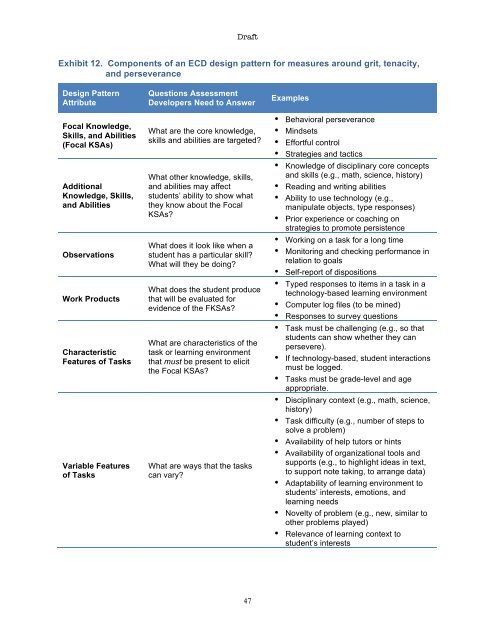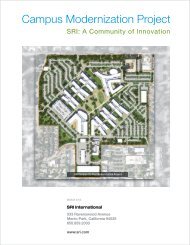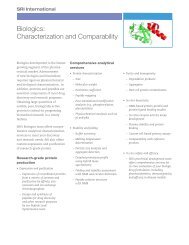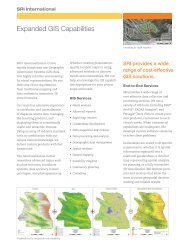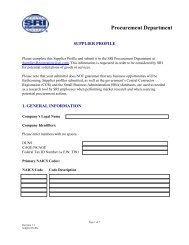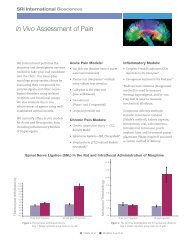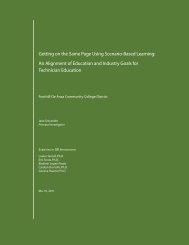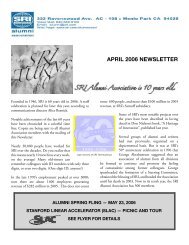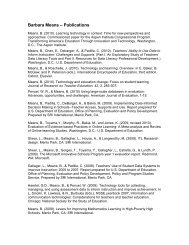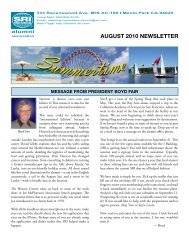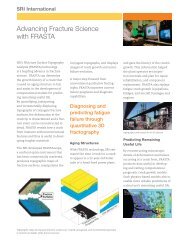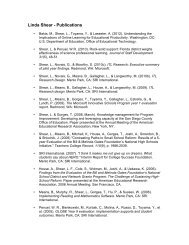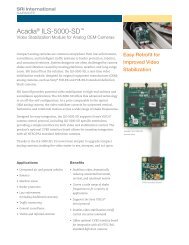Promoting Grit, Tenacity, and Perseverance - U.S. Department of ...
Promoting Grit, Tenacity, and Perseverance - U.S. Department of ...
Promoting Grit, Tenacity, and Perseverance - U.S. Department of ...
You also want an ePaper? Increase the reach of your titles
YUMPU automatically turns print PDFs into web optimized ePapers that Google loves.
Draft<br />
Exhibit 12. Components <strong>of</strong> an ECD design pattern for measures around grit, tenacity,<br />
<strong>and</strong> perseverance<br />
Design Pattern<br />
Attribute<br />
Focal Knowledge,<br />
Skills, <strong>and</strong> Abilities<br />
(Focal KSAs)<br />
Additional<br />
Knowledge, Skills,<br />
<strong>and</strong> Abilities<br />
Observations<br />
Work Products<br />
Characteristic<br />
Features <strong>of</strong> Tasks<br />
Variable Features<br />
<strong>of</strong> Tasks<br />
Questions Assessment<br />
Developers Need to Answer<br />
What are the core knowledge,<br />
skills <strong>and</strong> abilities are targeted?<br />
What other knowledge, skills,<br />
<strong>and</strong> abilities may affect<br />
students’ ability to show what<br />
they know about the Focal<br />
KSAs?<br />
What does it look like when a<br />
student has a particular skill?<br />
What will they be doing?<br />
What does the student produce<br />
that will be evaluated for<br />
evidence <strong>of</strong> the FKSAs?<br />
What are characteristics <strong>of</strong> the<br />
task or learning environment<br />
that must be present to elicit<br />
the Focal KSAs?<br />
What are ways that the tasks<br />
can vary?<br />
Examples<br />
• Behavioral perseverance <br />
• Mindsets <br />
• Effortful control <br />
• Strategies <strong>and</strong> tactics <br />
• Knowledge <strong>of</strong> disciplinary core concepts<br />
<strong>and</strong> skills (e.g., math, science, history) <br />
• Reading <strong>and</strong> writing abilities <br />
• Ability to use technology (e.g.,<br />
manipulate objects, type responses) <br />
• Prior experience or coaching on<br />
strategies to promote persistence <br />
• Working on a task for a long time <br />
• Monitoring <strong>and</strong> checking performance in<br />
relation to goals <br />
• Self-report <strong>of</strong> dispositions <br />
• Typed responses to items in a task in a<br />
technology-based learning environment <br />
• Computer log files (to be mined) <br />
• Responses to survey questions <br />
• Task must be challenging (e.g., so that<br />
students can show whether they can<br />
persevere).<br />
• If technology-based, student interactions<br />
must be logged.<br />
• Tasks must be grade-level <strong>and</strong> age<br />
appropriate. <br />
• Disciplinary context (e.g., math, science,<br />
history) <br />
• Task difficulty (e.g., number <strong>of</strong> steps to<br />
solve a problem) <br />
• Availability <strong>of</strong> help tutors or hints <br />
• Availability <strong>of</strong> organizational tools <strong>and</strong><br />
supports (e.g., to highlight ideas in text,<br />
to support note taking, to arrange data) <br />
• Adaptability <strong>of</strong> learning environment to<br />
students’ interests, emotions, <strong>and</strong><br />
learning needs <br />
• Novelty <strong>of</strong> problem (e.g., new, similar to<br />
other problems played)<br />
• Relevance <strong>of</strong> learning context to<br />
student’s interests <br />
47


